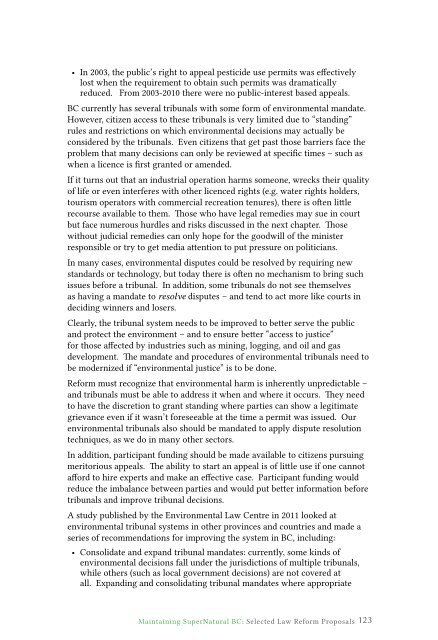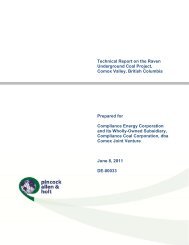Maintaining SuperNatural BC for Our Children - CoalWatch Comox ...
Maintaining SuperNatural BC for Our Children - CoalWatch Comox ...
Maintaining SuperNatural BC for Our Children - CoalWatch Comox ...
- No tags were found...
Create successful ePaper yourself
Turn your PDF publications into a flip-book with our unique Google optimized e-Paper software.
• In 2003, the public’s right to appeal pesticide use permits was effectivelylost when the requirement to obtain such permits was dramaticallyreduced. From 2003-2010 there were no public-interest based appeals.<strong>BC</strong> currently has several tribunals with some <strong>for</strong>m of environmental mandate.However, citizen access to these tribunals is very limited due to “standing”rules and restrictions on which environmental decisions may actually beconsidered by the tribunals. Even citizens that get past those barriers face theproblem that many decisions can only be reviewed at specific times – such aswhen a licence is first granted or amended.If it turns out that an industrial operation harms someone, wrecks their qualityof life or even interferes with other licenced rights (e.g. water rights holders,tourism operators with commercial recreation tenures), there is often littlerecourse available to them. Those who have legal remedies may sue in courtbut face numerous hurdles and risks discussed in the next chapter. Thosewithout judicial remedies can only hope <strong>for</strong> the goodwill of the ministerresponsible or try to get media attention to put pressure on politicians.In many cases, environmental disputes could be resolved by requiring newstandards or technology, but today there is often no mechanism to bring suchissues be<strong>for</strong>e a tribunal. In addition, some tribunals do not see themselvesas having a mandate to resolve disputes – and tend to act more like courts indeciding winners and losers.Clearly, the tribunal system needs to be improved to better serve the publicand protect the environment – and to ensure better “access to justice”<strong>for</strong> those affected by industries such as mining, logging, and oil and gasdevelopment. The mandate and procedures of environmental tribunals need tobe modernized if “environmental justice” is to be done.Re<strong>for</strong>m must recognize that environmental harm is inherently unpredictable –and tribunals must be able to address it when and where it occurs. They needto have the discretion to grant standing where parties can show a legitimategrievance even if it wasn’t <strong>for</strong>eseeable at the time a permit was issued. <strong>Our</strong>environmental tribunals also should be mandated to apply dispute resolutiontechniques, as we do in many other sectors.In addition, participant funding should be made available to citizens pursuingmeritorious appeals. The ability to start an appeal is of little use if one cannotaf<strong>for</strong>d to hire experts and make an effective case. Participant funding wouldreduce the imbalance between parties and would put better in<strong>for</strong>mation be<strong>for</strong>etribunals and improve tribunal decisions.A study published by the Environmental Law Centre in 2011 looked atenvironmental tribunal systems in other provinces and countries and made aseries of recommendations <strong>for</strong> improving the system in <strong>BC</strong>, including:• Consolidate and expand tribunal mandates: currently, some kinds ofenvironmental decisions fall under the jurisdictions of multiple tribunals,while others (such as local government decisions) are not covered atall. Expanding and consolidating tribunal mandates where appropriate<strong>Maintaining</strong> <strong>SuperNatural</strong> <strong>BC</strong>: Selected Law Re<strong>for</strong>m Proposals 123



